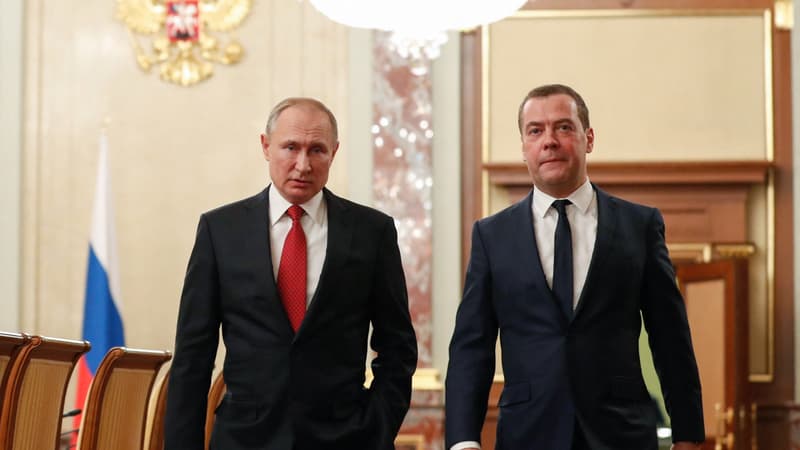From “special military operation” to “holy war”? For several weeks now, the Russian power has been trying to give a religious and sacred dimension to its offensive against Ukraine, while Dimitri Medvedev, number two on the powerful Russian Security Council, stated in early November that the “sacred objective” of the offense is ” stop the lord of Hell”. This rhetoric, however, divides even within the Orthodox Church.
“We fight against those who hate us, who ban our language, our values and even our faith,” said Dmitry Medvedev.
The enemies of Russia are the Ukrainian “Nazis” and the “dogs” of the West, the former head of state, close to Vladimir Putin, still denounces.
A “holy war” against the West
Showing the importance for the Kremlin of the spiritual dimension that it seeks to instill in its military intervention, Vladimir Putin affirmed, during his New Year greetings, that “moral correctness” was on the side of Moscow.
This affirmation illustrates the will of the authorities to dispel the doubts of a part of the population unbalanced by the entry of Russian troops into a country where the majority of believers are, as in Russia, Orthodox Christians.
As Moscow suffered several military setbacks, religious rhetoric gained increasing momentum from the fall, with top officials and state media describing the intervention in Ukraine as a “holy war” against a West portrayed as decadent.
Priests Sent to the Front
Beyond the speeches, the intertwining of the religious and the military is also manifested by the sending of dozens of priests to the front to support the soldiers. Military priest Sviatoslav Tchourkanov explains that these missions are intended to prevent soldiers from “losing their souls (…), even if the situation pushes them to do so.”
A priest must “root in the soul of the military that prisoners must not be tortured (…) We must not loot, we must not harm civilians,” he continues.
The cleric has no doubts about the merits of this assault on Ukraine, which, according to him, consists of defending the “traditional values” of which the Kremlin and the Russian Orthodox Church present themselves as protectors.
The sacrifice of the soldiers intended to “wash away sins”
Showing the importance of these clerics in the conflict, Vladimir Putin awarded the title of “Hero of the Russian Federation” in November, the country’s highest distinction, to an Orthodox priest killed in the combat zone, Mikhail Vasiliev.
The powerful leader of the Russian Orthodox Church, Patriarch Kirill, also expressed support for the military offensive, saying support should be given to pro-Russian “brothers” in eastern Ukraine who “rejected” Western values.
During a sermon in late September, he claimed that those killed while carrying out their “military duty” made a “sacrifice that washes away all sins.”
A rhetoric that divides within the Church
But this involvement of the Church in the conflict and the increasingly religious rhetoric surrounding it are not unanimous in Russia.
“This ‘holy war’ rhetoric comes straight from the Middle Ages,” said Andrei Kordotchkine, a Russian Orthodox priest stationed in Madrid.
If the Moscow Patriarchate shows outspoken support for the military intervention, it has caused a stir within the Orthodox world, with bitter fighting between the Russian and Ukrainian Orthodox churches.
A platform against the war signed by religious
Even within the Russian clergy, there are differences: as of March 1, 293 Orthodox religious have signed a platform against “fratricidal war.”
“It is not only (Russian) society that is divided, but also the Church and the clergy,” said priest Andrei Kordotchkine.
Several signatories to the text were sanctioned by the patriarchate when they were transferred from their parish, one of them confesses, on condition of anonymity. “In recent years, the ties between the high Orthodox hierarchy and power have been strengthened. The State has helped the Church a lot and that help has created a great dependency,” he adds.
Source: BFM TV


